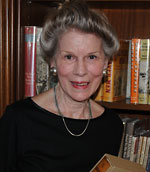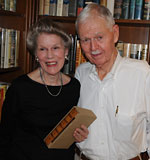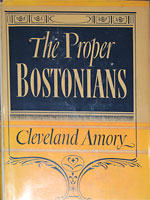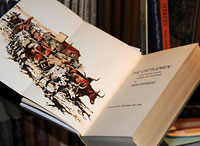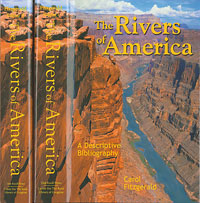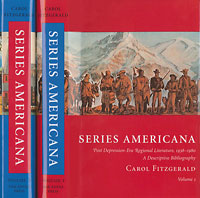Collective History
Carol Fitzgerald’s books, Series Americana and The Rivers of America, are the products of a passionate collector, scholar, and bibliophile. By Nicholas A. Basbanes
 Nicholas A. Basbanes recently received a National Endowment for the Humanities fellowship to work on his book on paper, which is forthcoming from Knopf. His most recent book is Editions & Impressions, a collection of essays. His other works include the acclaimed A Gentle Madness, Every Book Its Reader, Patience & Fortitude, Among the Gently Mad, and A Splendor of Letters.
Nicholas A. Basbanes recently received a National Endowment for the Humanities fellowship to work on his book on paper, which is forthcoming from Knopf. His most recent book is Editions & Impressions, a collection of essays. His other works include the acclaimed A Gentle Madness, Every Book Its Reader, Patience & Fortitude, Among the Gently Mad, and A Splendor of Letters.
There are countless reasons to justify the gathering of rare and important objects, though certainly one of the most persuasive—if, indeed, any rationale is in order at all—is to support the goals of scholarship. “Collecting is an empty vanity unless it’s useful,” is how the late Harry H. Ransom put it to a reporter for the New York Times in 1972.
What the founding spirit of the Humanities Research Center at the University of Texas, Austin was explaining in that instance was his rationale for creating an unsurpassed archive of twentieth-century manuscript materials, and the prospect it held out for attracting scholars from around the world to what he had boldly predicted would be a Bibliothèque National of the American Southwest. But his central point, certainly, was cogently expressed.
Another motive just as compelling is to preserve a cultural legacy that might otherwise be forgotten or lost entirely. Both of these considerations, it turns out—scholarship and preservation—are what drove Carol Fitzgerald of Fort Lauderdale, Florida, to research and write Series Americana: Post Depression-Era Regional Literature, 1938-1980, A Descriptive Bibliography, recently published by Oak Knoll Press in association with the Center for the Book at the Library of Congress, and based entirely on a collection of 163 books and supporting materials she acquired specifically for the purpose.
The two-volume, 1,028-page release is an interdisciplinary work that integrates the publication history of every title that was issued in thirteen separate series of American regional writing produced in the United States from 1938 through 1980 by nine different publishers, and includes full bibliographical descriptions, along with 242 sketches of every author, illustrator, and editor who participated. Written for the general readership, the books pursued such themes as American landmarks, seaports, forts, trails, customs, mountains, and lakes; nine titles published between 1944 and 1948 by Duell, Sloan & Pearce were collectively known as the Regional Murder Series.
Series Americana follows by eight years The Rivers of America, an 899-page effort also published by Oak Knoll Press and the Center for the Book in two volumes, and also based on a collection Fitzgerald had gathered. It was at a two-day symposium held at the Library of Congress in 1997 to celebrate that achievement, in fact, where I first met Carol Fitzgerald and her husband and editor, Jean, and decided that I had to include a profile of her in my book Patience & Fortitude as a salient example of what I call the scholar-collector. The materials she had assembled, including original artwork and correspondence, are now in the permanent collections of the Library of Congress, a gift to the nation from the Fitzgeralds; the books, in particular, represent every printing of every title issued in the 65-book Rivers of America series between 1937 and 1974, including variant copies, special editions, commemorative editions, and Armed Services Editions.
Fitzgerald had embarked on that project with the conviction, simply, that it was something worth doing, if only for her own satisfaction as a bibliophile. Recognition from the Library of Congress and publication by Oak Knoll Press was a validation of her efforts, and the same turns out to be the case with Series Americana, which she undertook, once again, without benefit of a contract.
“It was a natural enough progression for me, though I didn’t really know there was going to be another book until I started looking at the collection that I had already started,” Fitzgerald told me in a recent interview at her home in Fort Lauderdale. “I had acquired a good number of these other titles while I was collecting for the rivers series. I can’t say I planned to do this—but it was always under a blind, always there. And when I finished Rivers, it was clear to me there was another story to be told—many more stories to be told.”
Calling on a network of booksellers who had been so helpful to her in the earlier effort, Fitzgerald began filling out the various collections she identified as derivative, occasionally finding a particularly difficult item online. At first she envisioned a more modest approach to what she had done with the rivers. “I thought I was going to write a small, one-volume treatment telling the story of these other books that were inspired by the rivers series. But once I started, each one became a project unto itself.”
There was the American Landmarks series, for instance, which began in 1938 and was only published for four years. “But there were ten precious little volumes with photographs by Samuel Chamberlain,” she said, so acquiring all of them became part of the hunt. “There were 28 volumes in the American Folkways Series, most of them edited by Erskine Caldwell, and all wonderful. Before long I discovered the Society in America Series—The Proper Bostonians, The Lusty Texans of Dallas, The Spectacular San Franciscans were some of the titles—so I went after them too; and then there was a small little series, only seven volumes, that tell about the customs of New England, Maine, California, and Pennsylvania.”
Some of the books, she said, had done very well commercially, and a few of them, such as David Lavender’s story of the Oregon Trail, Westward Vision, and Mari Sandoz’s The Beaver Men and The Cattlemen, are still in print. But few have been the subject of bibliographical inquiry, and it was this omission that Fitzgerald sought to redress with her effort. Working directly with a number of institutions—the Bancroft Library at the University of California, Berkeley, the Lilly Library at Indiana University, Columbia University in New York, and Syracuse University Library among them—she located correspondence and archives that were pertinent to the study. Participating principals who were still alive—Lavender, the Californian author of western history, for instance—were interviewed for their insights.
“Carol is a demon researcher,” was the frank assessment offered by her husband and fellow bibliophile, Jean. “She was absolutely relentless in her pursuit. She was determined to describe how each book came to be, what each series was, what was going on at the time, who the author was, the illustrator—everything that pertains to its existence as a literary object. One thing we never did was put a limit on length. We wanted it to be thorough, and Carol stopped only when she felt it was complete. In my own immodest view, this is bibliography the way it is supposed to be done.”









